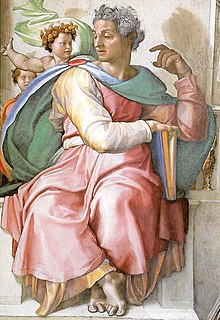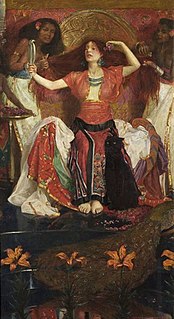
Obadiah is a character in 1 Kings in the Hebrew Bible. He was a majordomo in charge of Ahab's palace. [1]

Obadiah is a character in 1 Kings in the Hebrew Bible. He was a majordomo in charge of Ahab's palace. [1]
According to 1 Kings 18:4, Obadiah hid a hundred prophets of God in two caves, fifty in each, to protect them from Jezebel, Ahab's wife. Later statements of the prophet Elijah, where he describes himself as the only remaining prophet of Yahweh [2] led biblical theologian Otto Thenius to conclude that eventually they were captured and killed, but George Rawlinson and other commentators argue that Elijah means he is the only active prophet because the others are in hiding. [3]
While Ahab and Obadiah are surveying the land for relief from famine, Obadiah meets the elusive prophet Elijah, whom Ahab has been hunting. Elijah asks him to arrange a meeting with Ahab. Obadiah fears that while he goes to Ahab to announce that Elijah has requested a meeting, Elijah will disappear again and Ahab will kill Obadiah as a punishment. This was because every nation and kingdom was forced to make an oath with Ahab to officially declare that they were not lying whenever they failed to find Elijah's whereabouts. Obadiah was subject to these conditions as well. After being reassured by Elijah, Obadiah arranges the meeting. [4]
Peter Leithart compares Obadiah to Elijah and notes that both are faithful servants of God, but that they "radically differ in their position and mode of service": whereas "Elijah confronts Ahab from outside the court", Obadiah works for the preservation of the prophets from within Ahab's court. [5]
According to both rabbinic tradition and the tradition of the Eastern Orthodox Church, this Obadiah is the same person as the prophet who wrote the Book of Obadiah. [6]

Ahab was the seventh king of Israel, the son and successor of King Omri and the husband of Jezebel of Sidon, according to the Hebrew Bible. The Hebrew Bible presents Ahab as a wicked king, particularly for condoning Jezebel's influence on religious policies and his principal role behind Naboth's arbitrary execution.

Elijah was, according to the Books of Kings in the Hebrew Bible, a prophet and a miracle worker who lived in the northern kingdom of Israel during the reign of King Ahab. In 1 Kings 18, Elijah defended the worship of the Hebrew God over that of the Canaanite deity Baal. God also performed many miracles through Elijah, including resurrection, bringing fire down from the sky, and entering heaven alive "by fire". He is also portrayed as leading a school of prophets known as "the sons of the prophets". Following his ascension, Elisha, his disciple and most devoted assistant, took over his role as leader of this school. The Book of Malachi prophesies Elijah's return "before the coming of the great and terrible day of the LORD", making him a harbinger of the Messiah and of the eschaton in various faiths that revere the Hebrew Bible. References to Elijah appear in Sirach, the New Testament, the Mishnah and Talmud, the Quran, the Book of Mormon, and Baháʼí writings.

Isaiah was the 8th-century BC Israelite prophet after whom the Book of Isaiah is named.

Obadiah is a biblical prophet. The authorship of the Book of Obadiah is traditionally attributed to the prophet Obadiah.

Micaiah, son of Imlah, is a prophet in the Hebrew Bible. He is one of the four disciples of Elijah and not to be confused with Micah, prophet of the Book of Micah.

Jezebel was the daughter of Ithobaal I of Tyre and the wife of Ahab, King of Israel, according to the Book of Kings of the Hebrew Bible.

Elisha was, according to the Hebrew Bible, a prophet and a wonder-worker. His name is commonly transliterated into English as Elisha via Hebrew, Eliseus via Greek and Latin, or Alyasa via Arabic, and Elyasa or Elyesa via Turkish. Also mentioned in the New Testament and the Quran,[6:86][38:48] Elisha is venerated as a prophet in Judaism, Christianity and Islam and writings of the Baháʼí Faith refer to him by name.
According to the Talmud, there were 48 prophets and 7 prophetesses of Judaism. The last Jewish prophet is believed to have been Malachi. In Jewish tradition it is believed that the period of prophecy, called Nevuah, ended with Haggai, Zechariah, and Malachi at which time the "Shechinah departed from Israel".

Ilyās was a prophet and messenger of God (Allah) who was sent to guide the Children of Israel. He was given the prophetic mission to prevent people from worshipping idols. Ilyas is the prophetic predecessor to Alyasa. Some Islamic scholars believe, that Ilyas is from the progeny of Harun (Aaron).

James 5 is the fifth chapter of the Epistle of James in the New Testament of the Christian Bible. The author identifies himself as "James, a servant of God and of the Lord Jesus Christ" and the epistle is traditionally attributed to James the brother of Jesus, written in Jerusalem between 48 and 61 CE. Alternatively, some scholars argue that it is a pseudographical work written after 61 CE. This chapter contains a warning to the rich and an exhortation to be patient until the coming of the Lord.

2 Kings 1 is the first chapter of the second part of the Books of Kings in the Hebrew Bible or the Second Book of Kings in the Old Testament of the Christian Bible. The book is a compilation of various annals recording the acts of the kings of Israel and Judah by a Deuteronomic compiler in the seventh century BCE, with a supplement added in the sixth century BCE. This chapter focuses on the Israel king Ahaziah, the son of Ahab, and the acts of Elijah the prophet who rebuked the king and prophesied the king's death.

2 Kings 2 is the second chapter of the second part of the Books of Kings in the Hebrew Bible or the Second Book of Kings in the Old Testament of the Christian Bible. The book is a compilation of various annals recording the acts of the kings of Israel and Judah by a Deuteronomic compiler in the seventh century BCE, with a supplement added in the sixth century BCE. The first part of this chapter records the appointment of Elisha to succeed Elijah and Elijah's ascension to heaven, while the second part records some miraculous acts of Elisha showing that he has been granted power similar to Elijah's.

2 Kings 10 is the tenth chapter of the second part of the Books of Kings in the Hebrew Bible or the Second Book of Kings in the Old Testament of the Christian Bible. The book is a compilation of various annals recording the acts of the kings of Israel and Judah by a Deuteronomic compiler in the seventh century BCE, with a supplement added in the sixth century BCE. This chapter records Jehu's massacres of the sons of Ahab, the kinsmen of Ahaziah the king of Judah and the Baal worshippers linked to Jezebel. The narrative is a part of a major section 2 Kings 9:1–15:12 covering the period of Jehu's dynasty.

1 Kings 22 is the 22nd chapter of the First Book of Kings in the Old Testament of the Christian Bible or the first part of Books of Kings in the Hebrew Bible. The book is a compilation of various annals recording the acts of the kings of Israel and Judah by a Deuteronomic compiler in the seventh century BCE, with a supplement added in the sixth century BCE. This chapter belongs to the section comprising 1 Kings 16:15 to 2 Kings 8:29 which documents the period of Omri's dynasty. The focus of this chapter is the reign of king Ahab and Ahaziah in the northern kingdom, as well as of king Jehoshaphat in the southern kingdom.

2 Kings 6 is the sixth chapter of the second part of the Books of Kings in the Hebrew Bible or the Second Book of Kings in the Old Testament of the Christian Bible. The book is a compilation of various annals recording the acts of the kings of Israel and Judah by a Deuteronomic compiler in the seventh century BC, with a supplement added in the sixth century BCE. This chapter records some miraculous deeds of the prophet Elisha.

2 Kings 12 is the twelfth chapter of the second part of the Books of Kings in the Hebrew Bible or the Second Book of Kings in the Old Testament of the Christian Bible. The book is a compilation of various annals recording the acts of the kings of Israel and Judah by a Deuteronomic compiler in the seventh century BCE, with a supplement added in the sixth century BCE. This chapter records the reign of Joash as the king of Judah.

1 Kings 17 is the seventeenth chapter of the Books of Kings in the Hebrew Bible or the First Book of Kings in the Old Testament of the Christian Bible. The book is a compilation of various annals recording the acts of the kings of Israel and Judah by a Deuteronomic compiler in the seventh century BCE, with a supplement added in the sixth century BCE. This chapter belongs to the section comprising 1 Kings 16:15 to 2 Kings 8:29 which documents the period of Omri's dynasty. The focus of this chapter is the activity of prophet Elijah during the reign of king Ahab in the northern kingdom.

1 Kings 18 is the eighteenth chapter of the Books of Kings in the Hebrew Bible or the First Book of Kings in the Old Testament of the Christian Bible. The book is a compilation of various annals recording the acts of the kings of Israel and Judah by a Deuteronomic compiler in the seventh century BCE, with a supplement added in the sixth century BCE. This chapter belongs to the section comprising 1 Kings 16:15 to 2 Kings 8:29 which documents the period of Omri's dynasty. The focus of this chapter is the activity of prophet Elijah during the reign of king Ahab in the northern kingdom.

1 Kings 19 is the nineteenth chapter of the Books of Kings in the Hebrew Bible or the First Book of Kings in the Old Testament of the Christian Bible. The book is a compilation of various annals recording the acts of the kings of Israel and Judah by a Deuteronomic compiler in the seventh century BCE, with a supplement added in the sixth century BCE. This chapter belongs to the section comprising 1 Kings 16:15 to 2 Kings 8:29 which documents the period of Omri's dynasty. The focus of this chapter is the activity of prophet Elijah during the reign of king Ahab in the northern kingdom.
Obadiah is a masculine given name. It is of Biblical Hebrew origin, and its popularity derives from Obadiah, a prophet in the Hebrew Bible and in the religious traditions of Christianity, Judaism, and Islam.